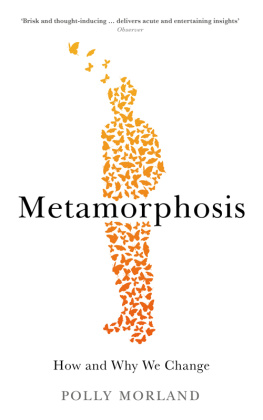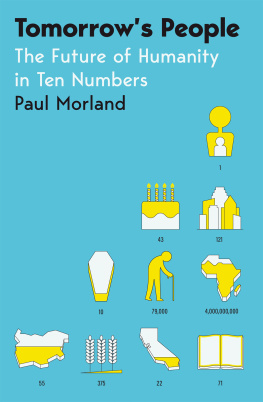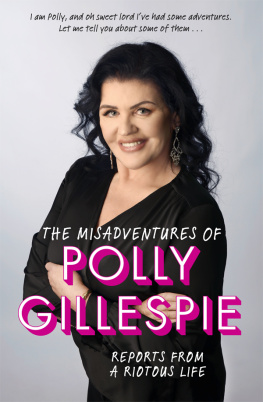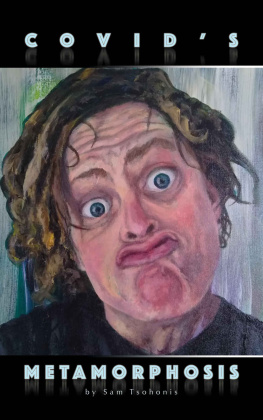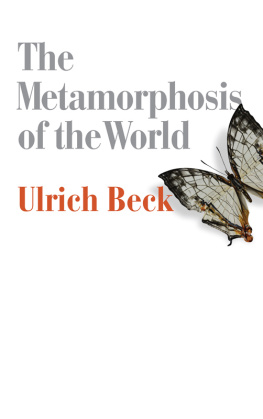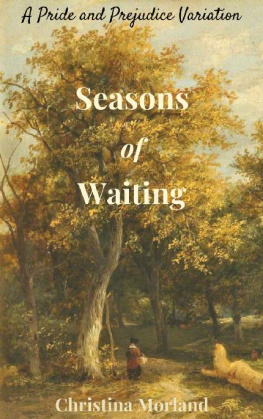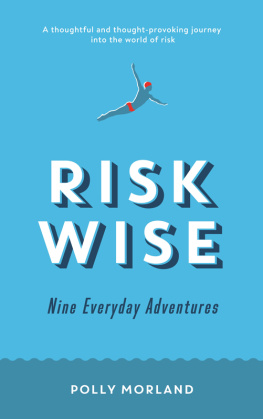Polly Morland - Metamorphosis : how and why we change
Here you can read online Polly Morland - Metamorphosis : how and why we change full text of the book (entire story) in english for free. Download pdf and epub, get meaning, cover and reviews about this ebook. year: 2017, publisher: Profile Books Ltd, genre: Art. Description of the work, (preface) as well as reviews are available. Best literature library LitArk.com created for fans of good reading and offers a wide selection of genres:
Romance novel
Science fiction
Adventure
Detective
Science
History
Home and family
Prose
Art
Politics
Computer
Non-fiction
Religion
Business
Children
Humor
Choose a favorite category and find really read worthwhile books. Enjoy immersion in the world of imagination, feel the emotions of the characters or learn something new for yourself, make an fascinating discovery.
- Book:Metamorphosis : how and why we change
- Author:
- Publisher:Profile Books Ltd
- Genre:
- Year:2017
- Rating:4 / 5
- Favourites:Add to favourites
- Your mark:
- 80
- 1
- 2
- 3
- 4
- 5
Metamorphosis : how and why we change: summary, description and annotation
We offer to read an annotation, description, summary or preface (depends on what the author of the book "Metamorphosis : how and why we change" wrote himself). If you haven't found the necessary information about the book — write in the comments, we will try to find it.
Metamorphosis : how and why we change — read online for free the complete book (whole text) full work
Below is the text of the book, divided by pages. System saving the place of the last page read, allows you to conveniently read the book "Metamorphosis : how and why we change" online for free, without having to search again every time where you left off. Put a bookmark, and you can go to the page where you finished reading at any time.
Font size:
Interval:
Bookmark:
FURTHER READING
What follows here is by no means a bibliography of past and current thinking on change. That would include more or less every novel ever written, a mountain literally of academic papers across the sciences and humanities, the lions share of songs, poetry and films. Change is everywhere, once you start looking for it. So instead here is simply a taste of the sources that have stirred this book into life and which may prove of interest to those keen to delve further.
General
The Garden of Forking Paths, Jorge Luis Borges, trans. Donald A. Yates, Labyrinths (Penguin, 1970)
Metamorphosis and Identity, Caroline Walker Bynum (Zone Books, 2005)
The Brain That Changes Itself, Norman Doidge (Penguin, 2007)
Heraclitus, Daniel W. Graham, The Stanford Encyclopedia of Philosophy, ed. Edward N. Zalta (Fall 2015 edn)
The Philosophical Baby, Alison Gopnik (The Bodley Head, 2009)
I Am A Strange Loop, Douglas Hofstadter (Basic Books, 2007)
The Metamorphosis, Franz Kafka, trans. Willa and Edwin Muir, The Complete Stories (Schocken Books, 1988)
Thinking, Fast and Slow, Daniel Kahneman (Penguin, 2012)
The Protean Self, Robert Jay Lifton (Basic Books, 1993)
The Stories We Live By, Dan P. McAdams (Guildford Press, 1997)
Of Art and the Future, Henry Miller, The Henry Miller Reader (New Directions, 1969)
Ecce Homo: How One Becomes What One Is, Friedrich Nietzsche, trans. R. J. Hollingdale (Penguin Classics, 1992)
Metamorphoses, Ovid, trans. Mary M. Innes (Penguin Classics, 1980)
On Becoming a Person, Carl Rogers (Constable, 1967)
Hallucinations, Oliver Sacks (Picador, 2012)
On Being a Self Forever, John Updike, Self-Consciousness (Penguin, 1990)
Identity, ed. Giselle Walker and Elisabeth Leedham-Green (Cambridge University Press, 2010)
Redirect: The Surprising New Science of Psychological Change, Timothy D. Wilson (Penguin, 2011)
Part I
Self-Efficacy, Albert Bandura (Psychological Review, 1977, Vol. 84)
Self-Efficacy in Changing Societies, ed. Albert Bandura (Cambridge University Press, 1995)
The Presocratic Philosophers, trans. Jonathan Barnes (Routledge, 1982)
The Helping Interview, Alfred Benjamin, 3rd edn (Houghton Mifflin, 1981)
Outlaw, Ray Bishop (Virgin, 2014)
Self Mastery through Conscious Autosuggestion, Emile Cou (1922)
Umbrella Sociology, Alistair Fraser (International Institute of Asian Studies Newsletter, No. 70, Spring 2015)
Gallups State of the Global Workplace report (2013) can be found at http://www.gallup.com/services/178517/state-global-workplace.aspx
We Wish To Inform You That Tomorrow We Will Be Killed With Our Families, Philip Gourevitch (Picador, 2000)
Genocide in Rwanda, AprilMay 1994, Human Rights Watch/Africa (Vol. 6, No. 4, 1994)
Principles of Psychology, William James (Henry Holt, 1890)
Possible Selves, Hazel Markus and Paula Nurius (American Psychologist, Vol. 41, 1986)
Making Good: How Ex-Convicts Reform and Rebuild Their Lives, Shadd Maruna (American Psychological Association, 2007)
Discovering Desistance, Prof. Fergus McNeills blog, http://blogs.iriss.org.uk/discoveringdesistance/author/fergusmcneill/
The Sociological Imagination, Charles Wright Mills (Oxford University Press, 2000)
Why Grow Up?, Susan Neiman (Penguin, 2014)
Metamorphosis, Frank Ryan (One World, 2011)
Penses, Blaise Pascal, trans. A. J. Krailsheimer (Penguin Classics, 1995)
Part II
Where is the Mango Princess?, Cathy Crimmins (Vintage, 2002)
Sexual Fluidity: Understanding Womens Love and Desire, Lisa M. Diamond (Harvard University Press, 2009)
Why We Love, Helen Fisher (Holt McDougal, 2005)
Modernity and Self-Identity, Anthony Giddens (Polity Press, 1991)
A Treatise of Human Nature, David Hume, ed. Ernest Mossner (Penguin Classics, 1985)
Habit, William James (Henry Holt, 1914), https://archive.org/details/habitjam00jameuoft
The Secret Life of Houdini, William Kalush and Larry Sloman (Scribner, 2007)
A General Theory of Love, Thomas Lewis, Fari Amini and Richard Lannon (Vintage, 2005)
Plutarchs Lives, trans. John Dryden, ed. Arthur Hugh Clough (Modern Library, 2001)
The Strange Case of Dr Jekyll and Mr Hyde, Robert Louis Stevenson (Penguin Classics, 2002)
Mike Waudbys website is www.theweightlosswarriors.co.uk and includes a link to his e-book about his experiences.
Part III
The Nicomachean Ethics, Aristotle, trans. J. A. K. Thomson (Penguin Classics, 2004)
The Anatomy of Stages of Change, editorial by Albert Bandura (American Journal of Health Promotion, Vol. 12, 1997)
Winter Notes on Summer Impressions, Fyodor Dostoevsky, trans. Kyril FitzLyon (Alma Classics, 2008)
A Theory of Cognitive Dissonance, Leon Festinger (Stanford University Press, 1957)
When Prophecy Fails, Leon Festinger, Henry W. Riecken and Stanley Schachter (Pinter & Martin, 2008)
Mans Search for Meaning, Viktor E. Frankl (Rider, 2004)
Stasiland, Anna Funder (Granta, 2011)
Ich folgte den falschen Gttern, Salomea Genin (Verlag fr Berlin-Brandenburg, 2012)
Shattered Assumptions, Ronnie Janoff-Bulman (Simon & Schuster, 1992)
Memories, Dreams, Reflections, Carl Jung (Fontana, 1995)
Inside the Jihad, Omar Nasiri (Basic Books, 2008)
Platos Republic, trans. Desmond Lee (Penguin Classics, 2007)
C. G. Jung Speaking, ed. William McGuire and R. F. C. Hull (Picador, 1980)
Paradoxical Effects of Thought Suppression, D. M. Wegner et al. (Journal of Personality and Social Psychology, Vol. 53, 1987)
Part IV
The Big Book, Alcoholics Anonymous (Hazelden Publishing, 2002)
The Perception of Change, Henri Bergson, Key Writings, ed. Keith Ansell Pearson and John Maoilearca (Bloomsbury, 2002)
A Long Bright Future, Laura L. Carstensen (Crown, 2009)
On the Origin of Species, Charles Darwin (Oxford University Press, 2008)
An Essay Concerning Human Understanding, John Locke (Wordsworth, 2014)
A Dancer in Wartime, Gillian Lynne (Vintage, 2011)
The Black Mirror, Raymond Tallis (Atlantic, 2015)
Triumphs of Experience, George E. Vaillant (Harvard University Press, 2015)
ACKNOWLEDGEMENTS
Thinking and writing about change for many months has been a transformative experience in itself. I am thankful to a great many people for making the process so rich and so revelatory, but above all I owe a huge debt of gratitude to those whose stories feature here for their time and for answering my impertinent questions with staggering honesty and insight. Metamorphosis is their book and it has been a delight and an inspiration to spend time with them.
Heartfelt thanks to all the team at Profile Books, including Andrew Franklin, Penny Daniel, Daniel Crewe, Pete Dyer, Steve Panton, Matthew Taylor, Simon Shelmerdine, Claire Beaumont, Anna-Marie Fitzgerald, Flora Willis and above all, my editor, Rebecca Gray. Her combination of cool intelligence and warm humanity not to mention a willingness to jot the odd cuss-word in the margin of my manuscript have become a pillar of my writing life over the last six years. The other constant has been my wonderful agent, Patrick Walsh, for whom I thank my lucky stars daily. His contributions are too many and too various to enumerate, but I am deeply indebted to him and to his brilliant team at Conville and Walsh.
Next pageFont size:
Interval:
Bookmark:
Similar books «Metamorphosis : how and why we change»
Look at similar books to Metamorphosis : how and why we change. We have selected literature similar in name and meaning in the hope of providing readers with more options to find new, interesting, not yet read works.
Discussion, reviews of the book Metamorphosis : how and why we change and just readers' own opinions. Leave your comments, write what you think about the work, its meaning or the main characters. Specify what exactly you liked and what you didn't like, and why you think so.

